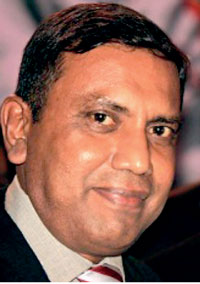Wednesday Feb 18, 2026
Wednesday Feb 18, 2026
Monday, 6 May 2024 00:00 - - {{hitsCtrl.values.hits}}
 By Athula Jayasekera
By Athula Jayasekera
We are a society that lacks direction and vision. It is no wonder that we produce mediocre people as the youth of this country lack the right role models to follow. We never encouraged world renowned people of the country to be in the limelight, for our youth to follow as role models.
Sri Lankan youth lacks contemporary role models to emulate. In business world too, we do not have Gates, Musks, Jobs, Bransons or Tatas. As there are no local figures to emulate our youth must study the lives of internationally known foreign leaders. They must draw inspiration from these personalities. As the country lacks and has a dearth of role models, people look for celebrities and sportsmen as role models.
A role model is someone others can look up to as a good example to follow. Most of them are known for their courage, confidence, definiteness of their purpose, belief, resilience, etc. They are accepted for their honesty, integrity and reliability. Some of those renowned role models have changed the course of the world for the better. People like Mahathma Gandhi, Nelson Mandela, and Martin Luther King have been instrumental in changing the direction of the world during their life time. Role Modelling at micro level can also inspire people to give good results. Role models at the work place can motivate and give confidence to the others. Role models can be influencers in organisations.
Even in trade unions there are role models who can greatly influence their membership with their presence. People look up to these personalities for their accomplishments. Role models in organisations play an important part like inspiring others and setting examples for others to follow. They can be agents of change too. Therefore, role models play a big role at both Macro and Micro levels. Studying the lives of good role models will inspire a person in his course for success and we as a country should cultivate the culture of role modelling.
There is a serious issue in our country at present because even at school functions the politicians, actors, sportsmen are given preference over academics, intellectuals and professionals. The children see only these kinds of half-baked personalities very often at their school functions, being invited as special or chief guests. It looks like school authorities are also reluctant to invite the intelligentsia as they too are comfortable and happy to be with the mediocre people.
Not that we do not have people of such calibre, we have people to look up to like Dr. Sarath Gunapala, Dr. Asha de Vos, etc. but their achievements are not widely known in the country. Only a few will know who these world-renowned scientists are. Majority of Sri Lankans will have only few achievements during their lifetimes. Yet they are happy with those mediocre achievements not knowing the potential they have to reach greater heights. We produce mediocre people and the country promotes mediocracy. We are comfortable being mediocre in life.
Since we have not been conditioned to aim high and be competitive since we were small, we are happy with mediocre success and to accept things as it is, and call it our destiny. As we were not exposed to the stories of people who have changed their destinies, we don’t know that destiny can be changed or re-written by the person him/herself. Yet when this mediocre Sri Lankan leaves the shores and starts a career in a foreign soil his or her productivity improves, and he/she becomes competitive. There are many who have reached greater heights in their adopted country. Some have even reached world standards. These achievers are not heard of by many as this information have not been considered important in Sri Lanka.
It is the mediocracy that prevails in the society that prevents us from achieving more and limits our potential. Since childhood we are trained to move on one path. Even in vulnerable, chaotic and uncertain situations, people still tread on the linear path for success. That is how the minds have been conditioned. We are not prepared or maybe we are scared to take the road that less people have travelled.
Then where is the root cause of the problem, is it the system or the people which become the barrier. We had top class civil servants, academics, planters, etc. and respectable politicians of international repute in the past. Is it the system that keeps producing mediocre personnel or is it that people have become satisfied by achieving mediocre standards without aiming to reach their full potential in life due to the prominence given to mediocracy?
(The writer is a Founder Member, first Chairman of TMC Colombo and a Past President of the Board of Management of TMC.)